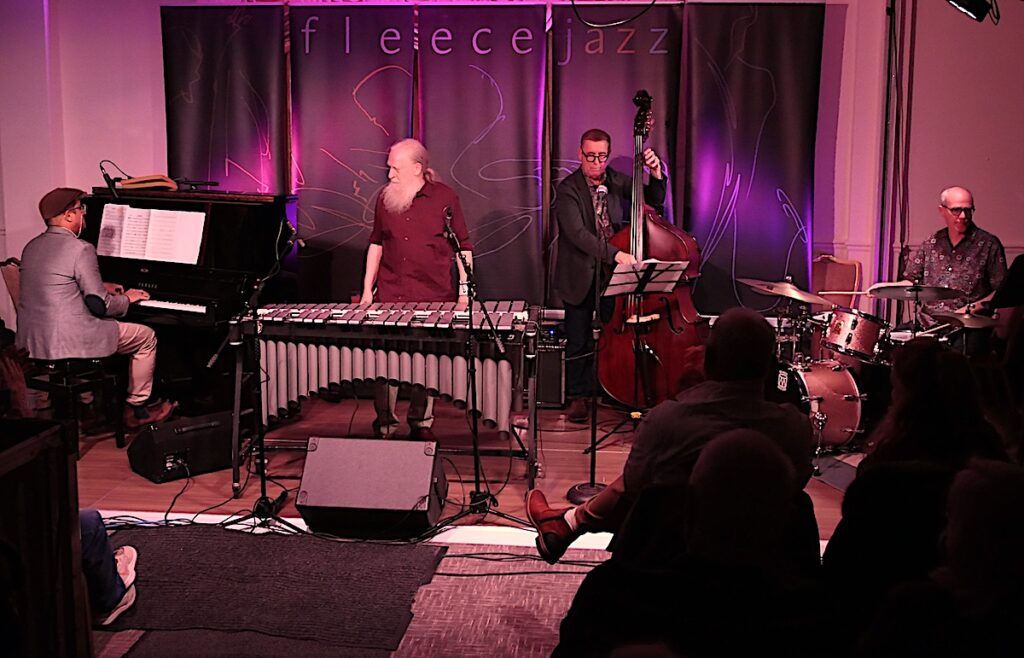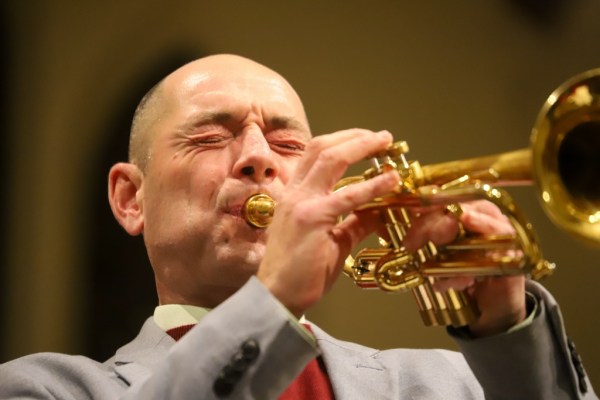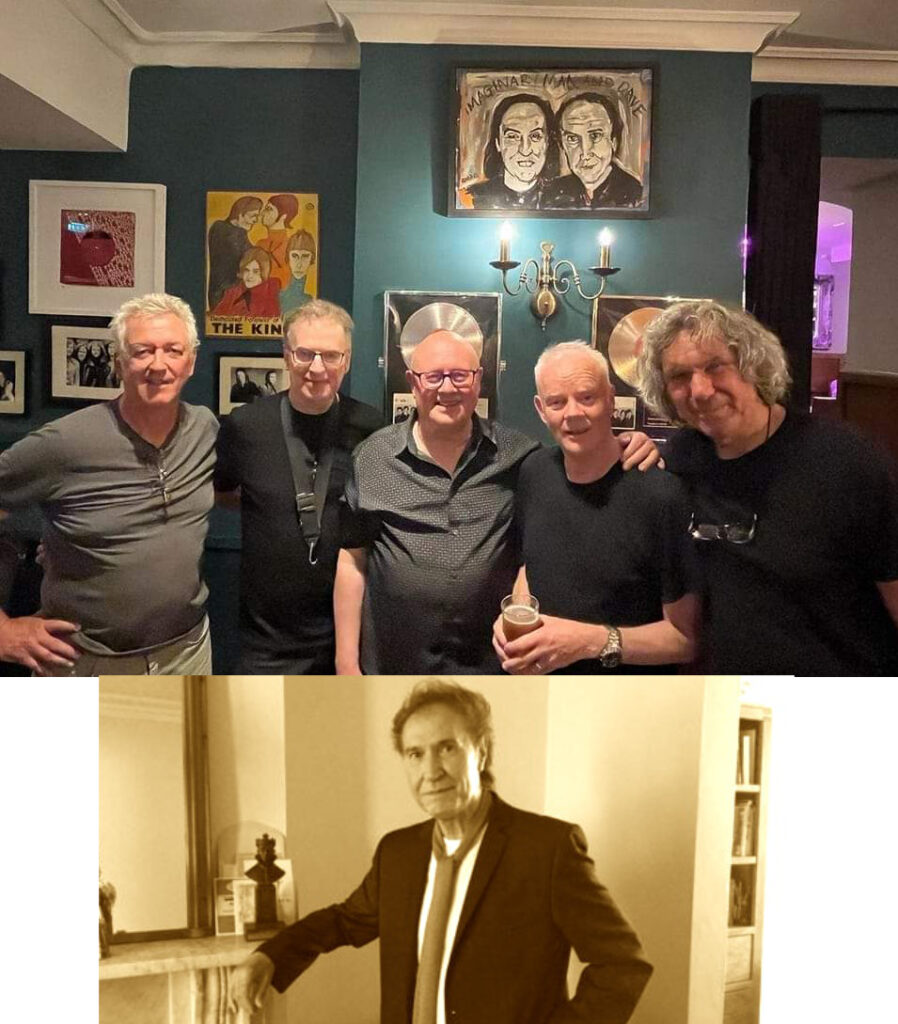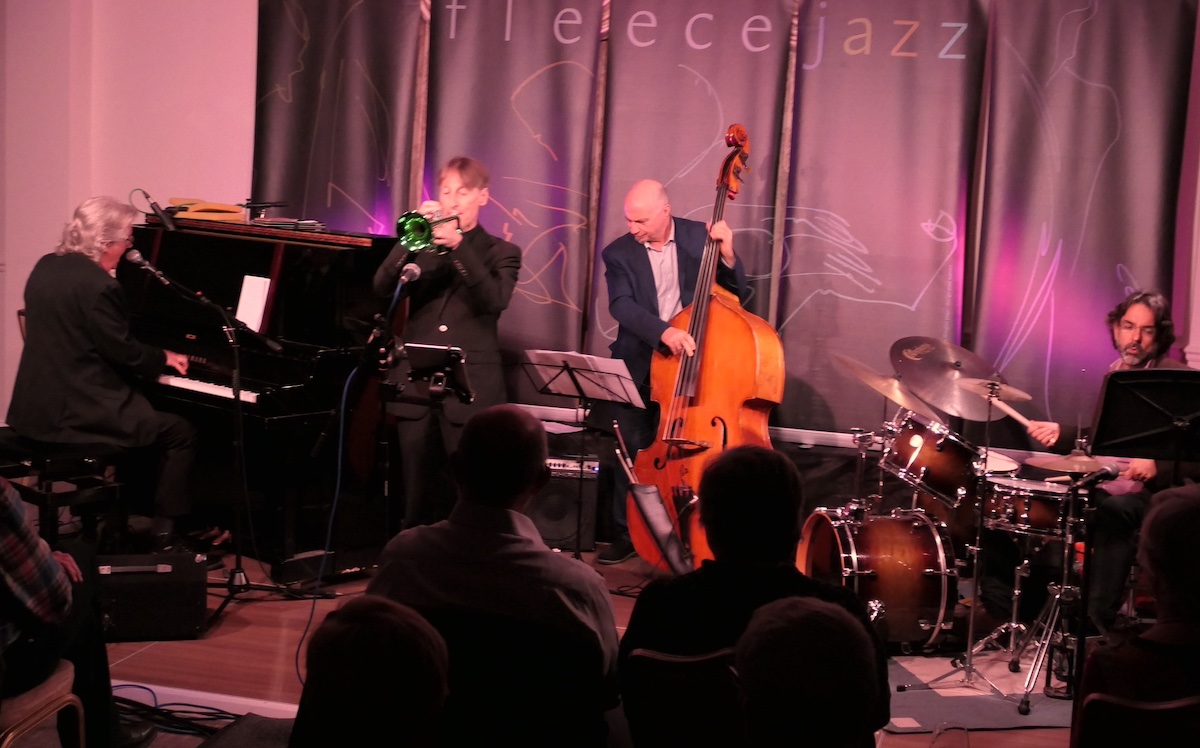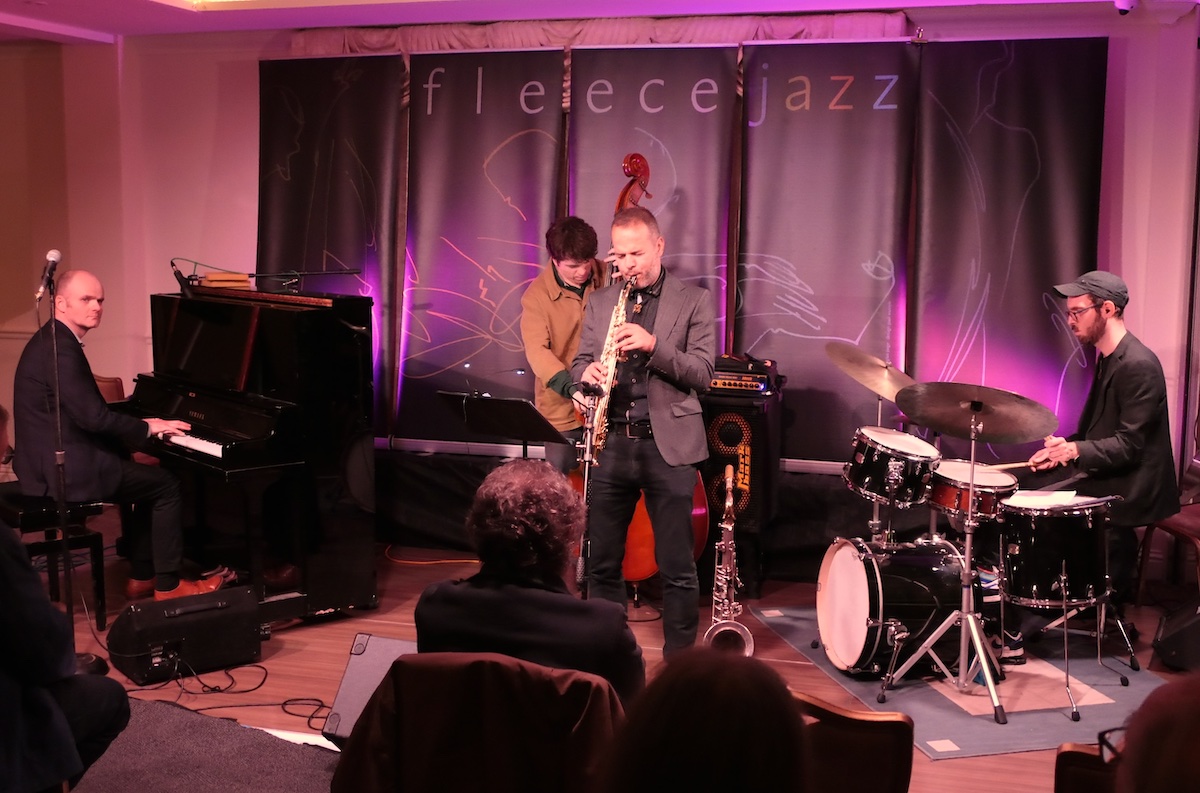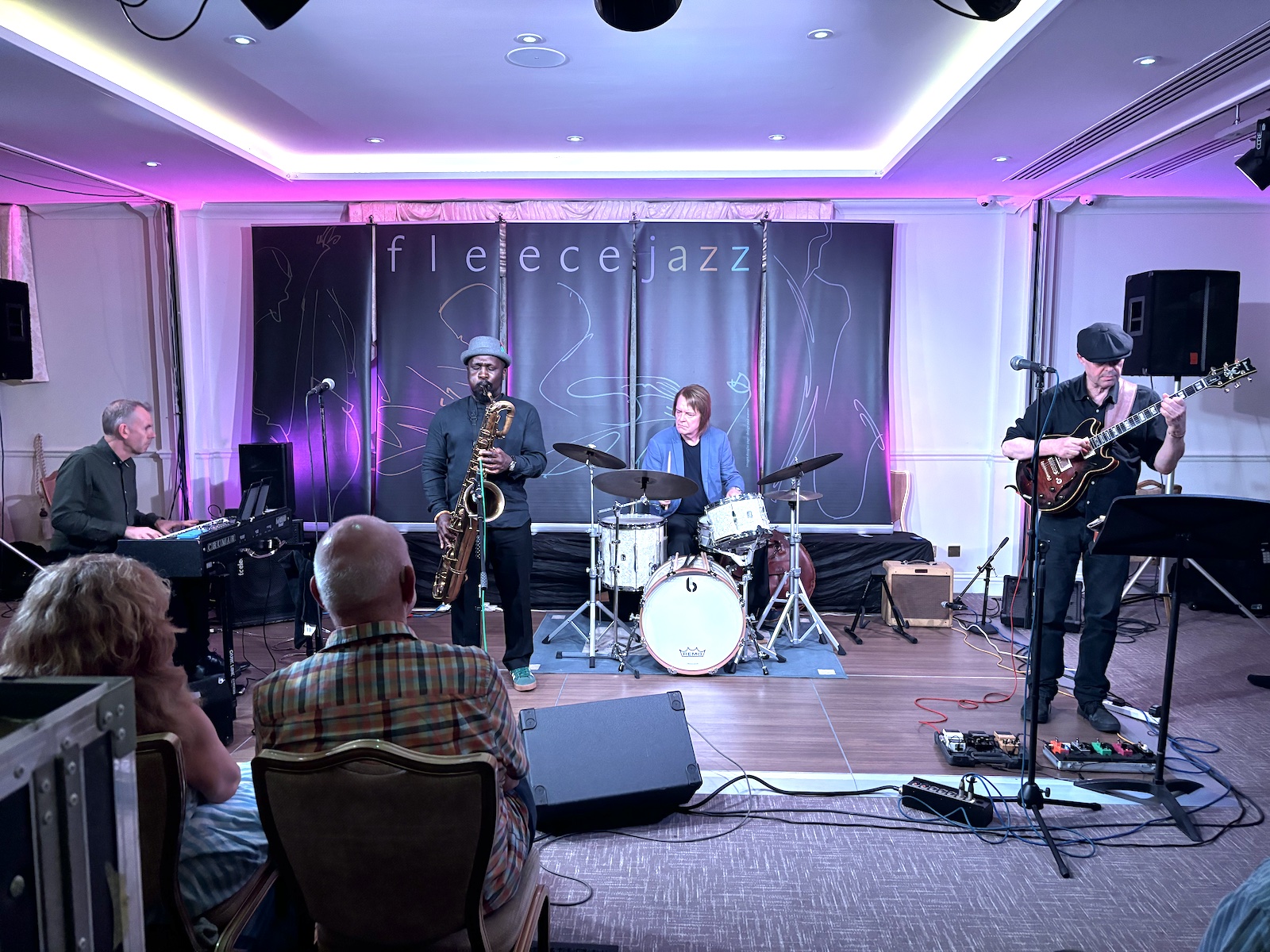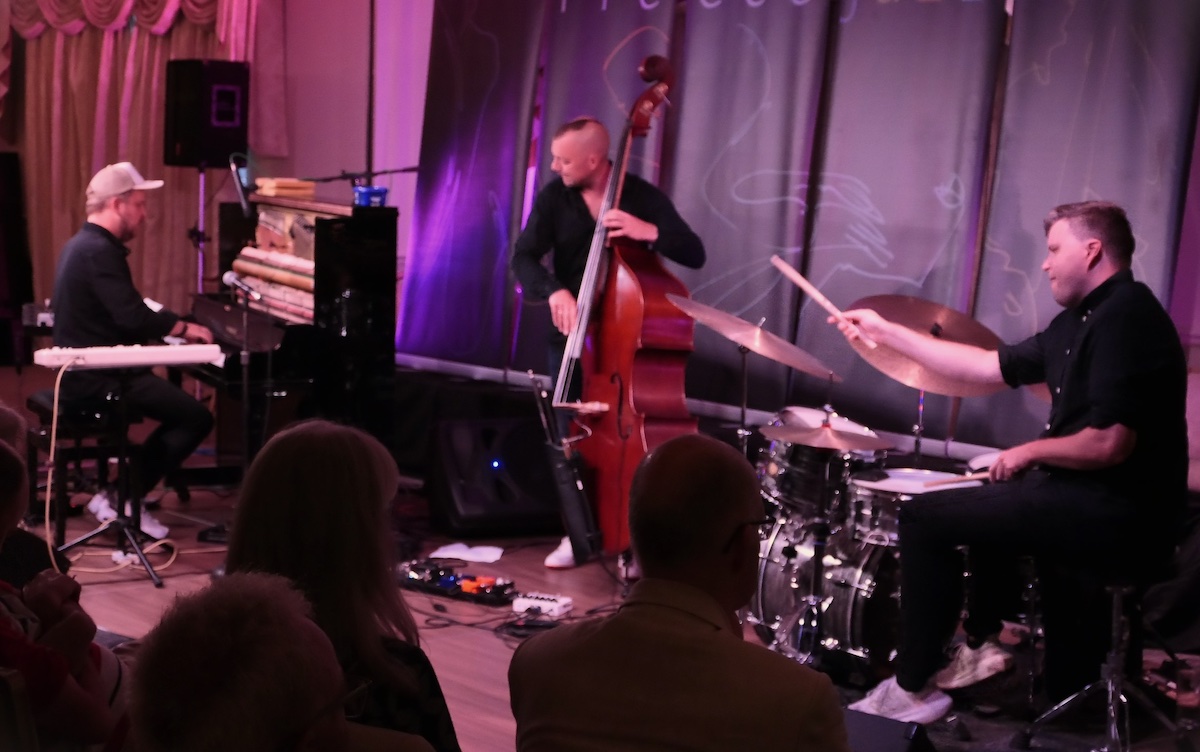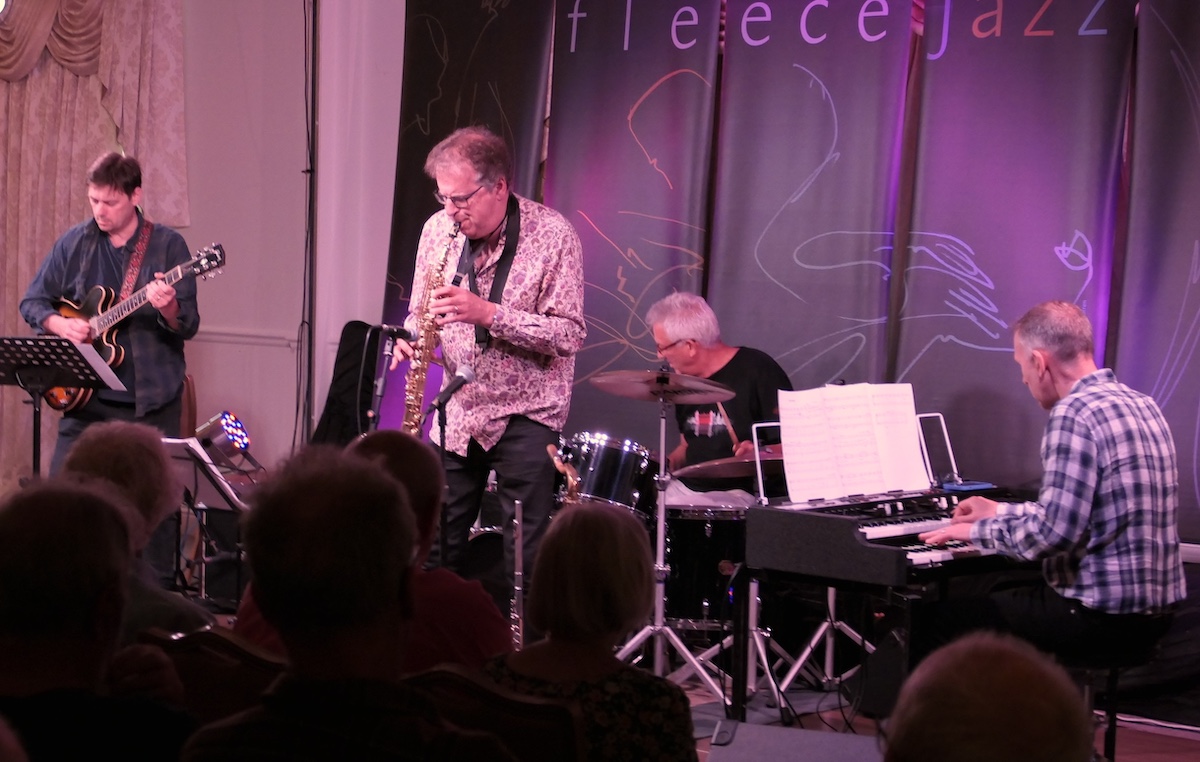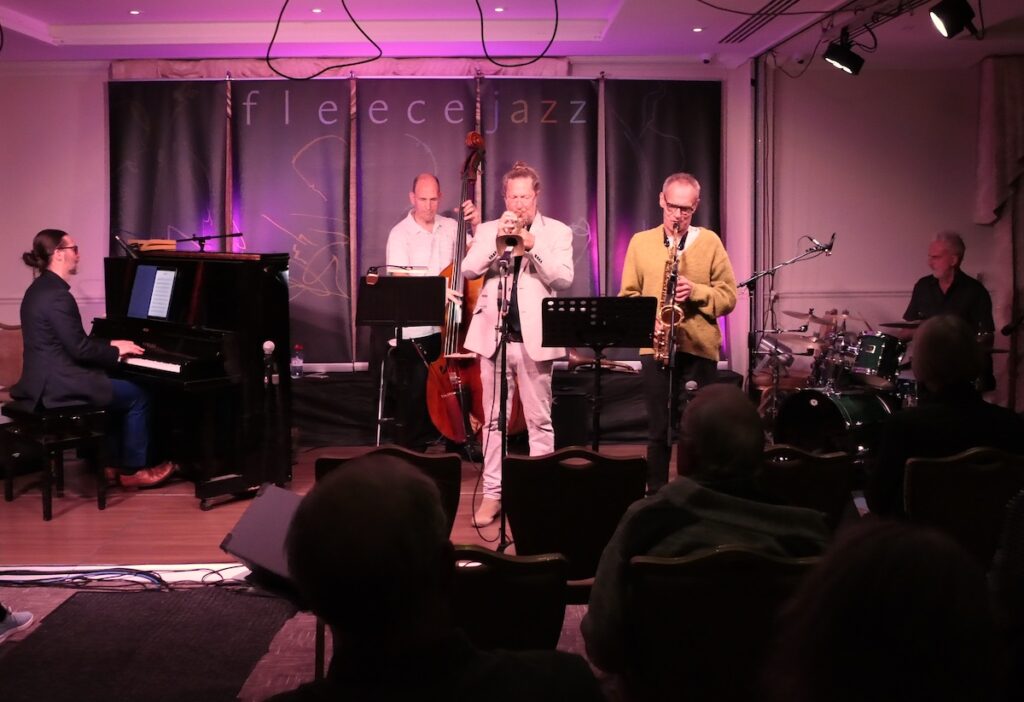
Steve said:
Bryan Corbett’s return to Fleece Jazz had been highly anticipated after he regrettably had to delay his booking scheduled for June for health reasons, which involved a period of extended convalescence. More than anything, it was so good to see how well he seems to be recovering.
As Bryan explained early on, he had originally been commissioned to present a concert with a Blue Note theme for a private event and this in turn led to wider public performances including tonight’s gig. He is held in such high regard by our jazz club that it was decided, with his agreement, to record and video the evening’s performance, keeping our sound engineers, Dave and Gerry, even busier than usual for much of the evening. Some additional filming was also taking place thanks to Dougie.
Bryan has a long-standing association and partnership with alto saxophonist Chris Bowden, pianist Paul Deats who owns the Nottingham Jazz Club, Peggy’s Skylight, Tom Hill who continued to keep our audience entertained with witty asides and observations as well as with some animated turns on the double bass and Nick Millward who keeps everything anchored and very occasionally breaks out on drums with triumphant volatility.
After our announcer, Miles, introduced the band, we are straight into a number from Art Blakey’s last album from the pen of his trombonist, Curtis Fuller. “Sortie” begins with a rolling piano figure from Paul, which precedes the main theme played by the horns, before transitioning to a more syncopated Latin-style bridge section. Bryan breaks off for the first solo, underpinned by a pulsating shuffling groove from the rhythm section followed by Chris, then Paul comes alive on piano with a blend of dexterity and lyricism. The performance ends with a reprise of the opening, the horn lines punctuated by Nick’s drums. After a few words from Bryan, we are back with Bobby Timmons’ “So Tired” bringing the volume down while maintaining the pace of the opener. Deats’ piano features more prolifically giving him an opportunity to demonstrate his swinging bluesy style, while reflecting the soulful style of the composer. Tom Hill takes up the theme on bass, working the whole instrument, from the very top to begin with, then steadily down, eliciting a deep woody sound that provides a contrast to the exuberant horns.
A break in tempo ensues with an original from Bryan, “Colour Vision” which is based on the Blue Note vibe, most notably Miles’ “Sketches of Spain”. Beginning with a beautifully melodic and delicate sound, the whole composition is lyrical and haunting, reminiscent of some of the best British Jazz from the ‘60s and ‘70s. On the quieter, slower numbers, it becomes clear just how well Bryan sculpts the sound with melodic grace like the very best jazz trumpeters.
It would be unheard of for a jazz trumpeter to pay homage to Blue Note without covering a number from Freddie Hubbard and it is “One of Another Kind” that brings the tempo back up to a more energetic level. Echoing the gleaming, mercurial style of the composer, both Bryan and Chris deliver fluid, exuberant runs mirroring the impressive cohesion of the rhythm section.
The first set concludes with Horace Silver’s minor hit “Senor Blues” which naturally provides Deats with an opportunity to stretch out and emulate the style of both Silver and also Duke Ellington on this exotically flavoured Latin gem. Bowden comes in on alto sax with an extraordinary solo before Hill moves his bass around to face the drummer and the two of them spar and goad each other to increasing heights of creativity.
The second set opens with Benny Golson’s “Grove’s Groove”, a laid-back swinger with a classic hard-bop sound, for which Bryan switches to flugelhorn, before introducing one of his own compositions from the album, “Green”, recorded with multi-instrumentalist Chris Dodds in 2013. “Happy” is given a fresh makeover here in a full band setting with its peppy rhythm and riffs, developing into a melodic, lyrical tune with an overall warm and uplifting mood. A comic interlude is often welcome: Tom Hill, a warm, friendly character as well as a cracking double bassist, asks the audience to join in with a drawling “Yeeeaaaah” at key points during the band’s rendition of Donald Byrd’s “Slow Drag”. This loose-limbed blues features a bass solo from Hill to match the hazy, lazy mood of the whole composition which is peppered with bursts of trumpet. Excellent audience participation helped conjure up that after-hours feel in a smoky, downtown bar. Bryan’s composition “Something Cuteish” has yet to be recorded which is a great shame as it was a real crowd pleaser. A long, extended run from Chris on alto sax notably stood out with Nick getting his first opportunity to deliver an extended drum solo, making full use of his kit in a barnstorming performance. Once again, the tempo switches and it is to the lesser known “Alone, alone and alone” as recorded by The Blue Mitchell Quintet. This beautiful, doleful tune gives each of the soloists plenty of opportunities to shine: Bryan features on flugelhorn once again, his delivery is elegant and soulful; Chris on alto sax producing that warm, smoky sound; the rhythm section restrained but nevertheless providing a reverent mood to the whole piece, drawing gasps of wonder and appreciation from our audience in the closing strains. All too soon we come to the last number with Lee Morgan’s “The Double-Up” which shares opportunities to feature as the lead, a fitting end to what felt like a very equitable showcase of each musician’s talents throughout both sets.
Finally, a word about our team of volunteers at Fleece Jazz. I have mentioned four in this review, we have a few more, but without them these gigs wouldn’t happen. If you would like to help keep the flame of live jazz alive at Fleece Jazz, contact us via email etc etc.
Dave said:
This a gig where I didn’t want to be on the sound desk; I just wanted to sit and listen. The recorded sound sounds great, and the videos look at first glance to be fine. I have a huge amount of work to get it all together, but it will be worth it. This was my gig of the year.
You will see from Steve’s set list that there was no encore. Believe me, this was not because the audience did not want one or more. We knew that most of the band had a drive home to the midlands, and gigs tomorrow, so we sadly let them go.
But we should have a gig of the same top quality when Simon Spillett arrives in three weeks time. He has Pete Whittaker on piano (the real one), Alec Dankworth on a welcome return on bass and Pete Cater on drums. Expect passion, power and precision. See you then.
Take care,
Dave
THE BRYAN CORBETT QUARTET SETLIST, FLEECE JAZZ 23/10/24
- Sortie (Curtis Fuller)
- So Tired (Bobby Timmons)
- Colour Vision (Bryan Corbett)
- One of Another Kind (Freddie Hubbard)
- Senor Blues (Horace Silver)
* * * * * * *
- Grove’s Groove (Benny Golson)
- Happy (Bryan Corbett)
- Slow Drag (Donald Byrd)
- Something Cuteish (Bryan Corbett)
- 10.Alone, alone and alone (Teramasa Hino)
- 11.The Double-Up (Lee Morgan)
